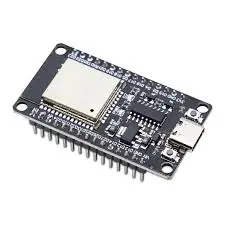ESP32 NodeMCU WiFi and Bluetooth Module
The ESP32 NodeMcu is a low-cost, versatile development board equipped with WiFi and Bluetooth capabilities, based on the powerful ESP32 microcontroller. With dual-core processing, 4MB flash memory, and extensive connectivity options, it serves as the perfect choice for IoT projects, home automation, robotics, and more. Whether you're an electronics hobbyist or a professional, the ESP32 NodeMcu opens doors to countless creative possibilities.
Package Includes:
1 x ESP32 NodeMcu Board
Features:
Dual-Core Processor: Based on the Xtensa LX6 architecture, enabling high-performance dual-core processing.
WiFi and Bluetooth: Integrated 802.11 b/g/n WiFi and Bluetooth 4.2 BLE connectivity for seamless wireless communication.
4MB Flash Memory: Provides ample storage for your programs and projects.
Flexible Serial Communication: Supports UART, I2C, SPI, and SDIO protocols to communicate with a variety of sensors and devices.
USB-to-Serial Converter: Simplifies programming and debugging via a standard USB connection.
12-bit ADC: Offers high precision for analog input readings, ideal for sensor integration.
PWM and Touch Sensors: Allows for controlling devices like LEDs or motors, and detecting touch inputs.
Low Power Consumption: Multiple power-saving modes, perfect for battery-powered projects.
Compatibility: Works with the Arduino IDE, MicroPython, and Lua, offering flexibility for different programming preferences.
Description:
The ESP32 NodeMcu board combines power and versatility in a compact, easy-to-use development platform. Built for IoT applications, robotics, and smart devices, the board’s dual-core processor and wireless capabilities make it an excellent choice for a variety of projects. It supports an array of interfaces and programming languages, ensuring compatibility with most components and development tools.
Whether you're building a home automation system, a weather station, or a smart robot, the ESP32 NodeMcu’s extensive features provide a solid foundation for your creations. With onboard USB-to-serial converters, ADC for analog sensors, and support for a range of wireless protocols, this board meets the needs of both beginner and advanced developers.
Pinout of the Module:
3.3V: Power supply pin for 3.3V devices.
VIN: External power input (5V to 12V, regulated to 3.3V).
GND: Ground pin.
SCL (22): Clock pin for I2C communication.
SDA (23): Data pin for I2C communication.
MOSI (19): SPI data transmit pin.
MISO (18): SPI data receive pin.
SCK (5): SPI clock pin.
CS (15): SPI chip select pin.
A0 (36), A3 (39), A6 (34), A7 (35), A4 (32), A5 (33): Analog input pins for sensors and voltage readings.
RX (0), TX (3): UART serial communication pins.
Pin 1 and Pin 2: General-purpose GPIO pins.
Pin 5 and Pin 17: GPIO and PWM output pins.
Applications:
Home Automation: Control smart devices like lights, temperature sensors, and locks.
IoT Projects: Build weather stations, smart agriculture systems, and environmental monitoring devices.
Robotics: Ideal for controlling robots, drones, and other autonomous systems.
Wireless Communication: Leverage Wi-Fi and Bluetooth for building wireless networks and devices.
Industrial Automation: Monitor and control industrial machinery and processes.
Data Logging: Collect sensor data and send it to servers or cloud platforms.
Education: Teach electronics, IoT concepts, and programming in schools and universities.
Wearables: Build low-power wearable devices like fitness trackers and smartwatches.
Principle of Work:
The ESP32 NodeMcu uses a combination of a dual-core processor, various interfaces (UART, I2C, SPI), and wireless modules (WiFi/Bluetooth) to perform tasks while maintaining low energy consumption. When powered on, the microcontroller executes the program stored in its 4MB flash memory, controlling the connected peripherals and communicating with other devices.
Code Example (Blink LED):
void setup() { pinMode(LED_BUILTIN, OUTPUT); // Set the built-in LED as output } void loop() { digitalWrite(LED_BUILTIN, HIGH); // Turn LED on delay(1000); // Wait for 1 second digitalWrite(LED_BUILTIN, LOW); // Turn LED off delay(1000); // Wait for 1 second }
Technical Details:
Processor: Tensilica LX6 dual-core
Clock Speed: 240 MHz
SRAM: 512 kB
Memory: 4 MB Flash
Wireless Standards: WiFi 802.11 b/g/n, Bluetooth Classic / LE
Operating Voltage: 3.3V (via 5V micro-USB)
Temperature Range: -40°C to 125°C
Dimensions: 48 x 26 x 11.5 mm
Comparisons with ESP8266 NodeMcu:
Processor: The ESP32 offers dual-core processing, whereas the ESP8266 has a single core.
Connectivity: The ESP32 supports both Wi-Fi and Bluetooth, while the ESP8266 only supports Wi-Fi.
GPIO Pins: The ESP32 has more GPIO pins, making it suitable for more complex projects.
Power Consumption: The ESP8266 is more power-efficient, which may be better for battery-powered applications.
Price: The ESP8266 is less expensive, but the ESP32 provides more features and flexibility.
With the ESP32 NodeMcu, you have a powerful, flexible, and energy-efficient platform that will elevate your projects, whether you're building home automation systems, robotics, or wireless communication systems. Start today and unlock endless possibilities!
